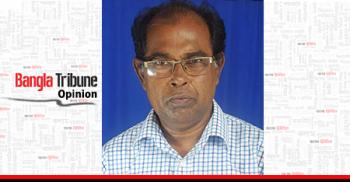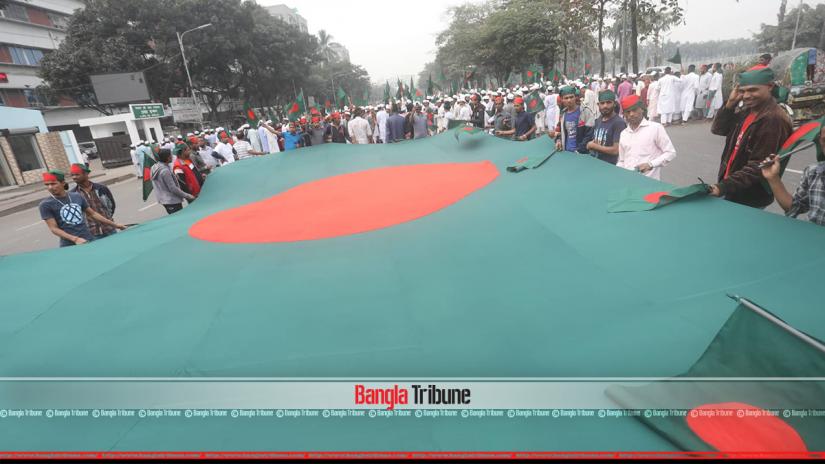 Our Victory Day is not a mere commonplace sort of day, it is a complex, multi-layered day related to the history of the nation. It takes us back to 14 August 1947- around 72 years back from the present. Many epoch-making events both positive and negative are an integral part of our history leading to this Victory Day (16th December). To say, it’s a consequential chapter of a history which belongs to none but the Bengalees across the whole world is no exaggeration. A countryman who cannot relate or resonate mentally with this day lacks the real entity of a Bangali.
Our Victory Day is not a mere commonplace sort of day, it is a complex, multi-layered day related to the history of the nation. It takes us back to 14 August 1947- around 72 years back from the present. Many epoch-making events both positive and negative are an integral part of our history leading to this Victory Day (16th December). To say, it’s a consequential chapter of a history which belongs to none but the Bengalees across the whole world is no exaggeration. A countryman who cannot relate or resonate mentally with this day lacks the real entity of a Bangali.
We all know that Pakistan emerged in 1947 as an independent state for the Muslims of what was undivided India at the end of almost two hundred years of British rule, rousing great hopes and aspiration among East Pakistani people. But disillusionment followed among the people of this province within two years of the birth of Pakistan. Quide Azam Muhammad Ali Jinnah declared Urdu to be the official language even for the people of this part of this country. The same stand was followed by the subsequent rulers- namely Liakot Ali Khan, Khaza Nazimuddin and finally Nurul Amin---- and he went even to the extent of perpetrating genocide on the 21st February 1952 to foil the Bengali language movement.
West Pakistani rulers proved to be predators, exploiters and oppressors of this province through their discriminatory treatment. The simple-minded gullible Benglees fell prey to their discriminatory policies in economy, education, politics, service, communication etc. It is deplorable that the West Pakistanis men siphoned off the earning of the Bengalees to their province to enrich themselves. They made every possible attempt to better their communication, standardise their education and modernise their lives, paying no heed to the East Pakistani people’s rightful share in these sectors. Bizarrely enough since “Might is right” become the criterion of wielding power, a democracy where people’s franchise is honoured was exiled from the country. The throne came under the grip of Major General Iskander Ali Mirza who was shortly ousted by another usurper Ayub Khan. This military junta’s automatic resign lasted approximately a decade. A formidable nationwide uprising toppled down him in 1969 and instantly another brute Yahya Khan seized the power promising to restore democracy- the long-cherished demand of Bengalees. Accordingly, in 1970 there came about an election where populist leader Bangabandhu Sheikh Mujibur Rahman’s party the Awami League earned a landslide victory. As a result, Zulfikar Ali Bhutto and Yahya’s expectations were utterly shattered. As the turn of handing over the power to Sheikh Mujib appeared, the duo started dilly-dallying as if the throne was their paternal property. East Pakistani people’s undisputed leader was hell-bent to resolve the crisis in a peaceful manner nonetheless, but he found all the doors of negotiation locked. At this point, the only option for him was to cut off all relationship with West Pakistan. He did the same. In Dhaka Race Course Maidan where people from all walks of life irrespective of caste, creed, colour and age huddled, as the great patriot delivered his fiery speech of March 7 asking them to forge a rock-solid unity against the West Pakistani rulers. He categorically declared the independence of his motherland.
The situation took the worst possible turn. Following the departure of Yahya Khan from Bangla, armed West Pakistani forces cracked down upon the unarmed civilians of the country under the command of Tikka Khan, known to all as the ill-famed butcher of Baluchistan. Firstly, they massacred the intelligentsia, the elite and talented people dwelling at Dhaka. Since 25th March to the last moment of their occupation, they committed A blood curdling genocide, plundered and torched people’s houses, perpetrated sabotage and tortured the innocent. For their carnal pleasure, they toyed with the chastity of the Bangli women with sadism, many of whom were university students. Sheikh Mujib was flown to West Pakistan to pass nine months of his life behind bars there. So-called youths - both male and female being galvanised with the spirit of patriotism joined the Mukti Bahini and fought valiantly against the occupation forces in line following the call of their great leader. Apart from training up the freedom fighters with basic skill of warfare, our neighbouring country India sheltered millions of Bangali refugees on humanitarian ground. In fact, what they did in support of us during those days is a remarkable instance of neighbourly fraternity in the history of the World. Under
So-called youths - both male and female being galvanised with the spirit of patriotism joined the Mukti Bahini and fought valiantly against the occupation forces in line following the call of their great leader. Apart from training up the freedom fighters with basic skill of warfare, our neighbouring country India sheltered millions of Bangali refugees on humanitarian ground. In fact, what they did in support of us during those days is a remarkable instance of neighbourly fraternity in the history of the World. Under
The joint command of Colonel Osmani, as well as General J.S. Arora our warriors unitedly with the Indian forces, confronted their enemies with unflinching courage by a guerrilla hit and run policy.
After nine months of the bloody civil strife, Pakistani hyenas seemed to have heard their death knell with no way to retreat. At this critical juncture, the army led by A. K. Niazi surrendered en masse to our allied forces. The ultimate result was the Bangalee’s long dreamt triumph in the war and the attainment of the 16th December- a day of immeasurable dignity for the Bengali nation.
In a broad sense, this 16th December is a long history which reminds the nation of its long unhappy past of oppression. From another perspective, it can rightly be considered a process of an incarnation of nationalism and a tale of patriotism. An independent nation in a sovereign country in the map of the World ---that is the message of this day. None other but this blissful day installed Sheikh Mujib as the father of the nation. It will remain enshrined in the history of mankind as a perpetual source of inspiration for those who want to establish justice, peace, human right and exploitation, by annihilating the oppressors. For the generations to come, it will convey the message that truth and righteousness always triumph over falsehood and wrong. This 16th December is an embodiment of the supreme sacrifice of martyrs, the agony of mothers who lost their sons, of vigorous protestation against inhumanity. Hence, its appeal to the mind of the Bangalees will be ever-enduring. In one sense, it is a fact of soberness and deep pathos emanating from the loss of valuable lives. In another sense, it is not only majestic but also pleasurable with the enormous glory of emancipation from the shackle of the predators. It is true that the countrymen observe the day with due solemnity through some customary rites and rituals like seminars or symposia, garlanding the martyrs, graves, paying home to their memory. These may be as perfunctory or ostentatious as eyewash which is tantamount to the degradation of the noble sons of the liberation war. So, we ought to imbibe the spirit of self-abnegation plus large-heartedness of the contributors towards our liberation and combine it with the spree of external activities so that their true assessment can be ensured through the implementation of the dream to which they dedicated themselves. Only this can be our desired approach to our hard-earned Victory Day- the 16th December.
Emdadul Haque is a lecturer of English at the Moheshpur Government College in Jhenidah.
 Opinion
Opinion
41271 hour(s) 17 minute(s) ago ;
Morning 10:11 ; Wednesday ; Jul 02, 2025
Our Victory Day
Send
Emdadul Haque
Published : 16:28, Dec 15, 2018 | Updated : 17:49, Feb 06, 2019
Published : 16:28, Dec 15, 2018 | Updated : 17:49, Feb 06, 2019
0 ...0 ...
/hb/
Topics: Emdadul Haque
***The opinions, beliefs and viewpoints expressed in this article are those of the author and do not reflect the opinions and views of Bangla Tribune.
- KOICA donates medical supplies to BSMMU
- 5 more flights to take back British nationals to London
- Covid19: Rajarbagh, Mohammadpur worst affected
- Momen joins UN solidarity song over COVID-19 combat
- Covid-19: OIC to hold special meeting
- WFP begins food distribution in Cox’s Bazar
- WFP begins food distribution in Cox’s Bazar
- 290 return home to Australia
- Third charter flight for US citizens to return home
- Dhaka proposes to postpone D8 Summit
Unauthorized use of news, image, information, etc published by Bangla Tribune is punishable by copyright law. Appropriate legal steps will be taken by the management against any person or body that infringes those laws.
Bangla Tribune is one of the most revered online newspapers in Bangladesh, due to its reputation of neutral coverage and incisive analysis.
F R Tower, 8/C Panthapath, Shukrabad, Dhaka-1207 | Phone: 58151324; 58151326, Fax: 58151329 | Mob: 01730794527, 01730794528


